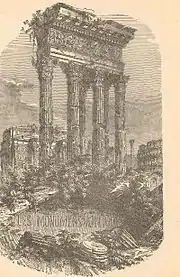Pope Pius IX and Germany
Foreign relations between Pope Pius IX and Germany were often tense during the pontiff's long papacy, with the latter culminating with the anti-Catholic persecutions of the Kulturkampf shortly before Pius's death in the 1870s. However, during this time the Catholic Church also experienced a period of continuous growth in terms of the number of faithful and clergy.

Post-1848 Church expansion
During the pontificate of Pius IX, the Catholic Church began to flourish and expand after the 1848 revolution resulted in additional religious freedoms in Protestant areas. The German lay people formed Pius Vereine and numerous other organizations loyal to the papacy and willing to put into practice Catholic teachings in everyday life.[1] The German bishops formed one of the first Catholic Bishop Conferences, which since 16 November 1848, met annually ever since. The bishop conferences formulated requests to the German State and issued pastoral directives. The Pope welcomed this association, refused however to give permission for the holding of a German regional council.[1] The Prussian constitution of 1850 guaranteed complete freedom to the Catholic Church.
Catholics under a Protestant empire
Decisive military victories of Prussia against all German States and Austria in Königgrätz in 1866, and of the German States in Sedan against France in 1870 and the creation of Second German Empire in 1870 with a Protestant emperor were viewed in Berlin as a victory of Protestantism over Catholicism. The outcome of the First Vatican Council with the definition of Papal infallibility raised Protestant and liberal Catholic fears of papal interference in German affairs[1] and resulted with the Kulturkampf by Otto von Bismarck in drastic restrictions for the Catholic Church in the areas of education, sermon preaching, the formation of its priests and the functions of bishops. Five of eleven Prussian bishops were arrested.[2] Several Religious and religious congregations were outlawed and Jesuits had to leave the country with a law of 7 July 1872. They were only readmitted in 1917.[2]
Opposition to priests and bishops
Catholics were considered loyal to the Pope and not to Germany did not have the same civil rights or access to government positions as did Germans of Protestant or Jewish faith. By 1878, two-thirds of the Catholic bishops were forcefully removed from their positions and over 1000 parishes were without priests.[1] Germany attempted to further weaken the Catholic Church by expropriating churches and institutions and turning them over to the Old Catholics, a small sect of liberal Catholics, which split from the main Church after Vatican One, without being able to gain much support despite of the official State interventions. The Protestant House of the Grand Duchy of Baden claimed the right not only to appoint Bishops but also Parish priests and other Catholic Church employees.[3] The government declared, that Catholic seminarians must, before they could be ordained, undergo a State examination. Despite of protests by Pius IX, eighty-year-old Archbishop Hermann von Vicari refused and was put on a criminal trial resulting in his 24-hour government supervision by the State Police. His priests were imprisoned, exiled or fined.[3]
Catholicism getting stronger
Despite of, or some say, because of the ongoing persecution, Catholicism in Germany actually got stronger. Its political representatives of the Centre Party gained in popularity and its press and local organizations flourished.[1] After the death of Pius IX, von Bismarck attempted to make peace with his more diplomatic successor Pope Leo XIII and over time rescinded most but not all of the discriminatory legislation against the Catholic Church and populations. On 27 May 1887, Leo XIII announced the formal end of the Kulturkampf[4]

References
- Franzen 365
- Franzen 364
- Shea 200
- Franzen 369
